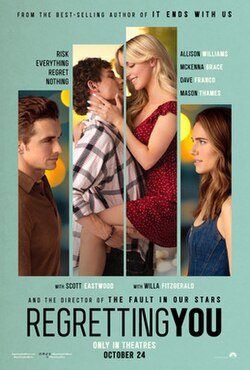Regretting You
Posted on October 23, 2025 at 5:29 pm
B-| Lowest Recommended Age: | High School |
| MPAA Rating: | Rated PG-13 sexual content, teen drug and alcohol use, and brief strong language |
| Profanity: | Brief strong language |
| Alcohol/ Drugs: | Drinking, including teen drinking and drunkenness, and brief marijuana smoking |
| Violence/ Scariness: | Off-screen fatal car accident, characters killed including parents |
| Diversity Issues: | None |
| Date Released to Theaters: | October 24, 2025 |
“Regretting You” is not a good movie. It is soapy and insipid. But somehow, thanks to its actors, it is still mildly, wait-for-streaming, watchable.

It begins 17 years ago, with two teenage couples on their way to a beach party. Serious and thoughtful Morgan (Allison Williams) and her fun-loving sister, Jenny (Willa Fitzgerald) are dating fun-loving Chris (Scott Eastwood) and serious and thoughtful Jonah (Dave Franco). “How did we end up with our exact opposites?” Jonah asks Morgan as Jenny and Chris drink beer and party by the bonfire. Morgan tells Jonah that she is pregnant.
In present day, Morgan and Chris are married and living in Chris’ childhood home with a 16 year old daughter, Clara (McKenna Grace). The family is gathering for Morgan’s birthday. Jonah has returned to town after a 15 year absence and reunited with Jenny. They have a baby and have decided to get married. It is a warm and loving celebration but there are glimpses of some underlying strains. Chris says, “I’ll wash the dishes,” and Morgan says to herself, “I’ve already done them.” And Morgan is hesitant to express happiness over her sister’s engagement.
On the way to the birthday party, Clara stopped to give “the coolest boy in school” a ride home. He is Miller (Mason Thames, the highlight of the movie), and he lives on a farm with his ailing but peppery grandfather (Clancy Brown).
A terrible accident is followed by revelations of secrets that shatter the surviving characters’ sense of themselves and their history. The question of whether those secrets should be shared with someone they will hurt has no good answers. The characters must struggle with the loss of the people they loved most and with the loss of the sense of trust and purpose and connection they thought they had.
There are some odd choices in the storyline, and too many references to pizza and jolly ranchers (not together, though pineapple and pizza are together), odd or too-on-the-nose choices for what the characters watch on television (“Clueless?” “Our Town?”), and an unnecessarily convenient twist to help resolve things at the end.
Some books are hard to adapt because the lyricism of the prose does not translate to the screen. Others are hard to adapt because we do not realize how much imagination we bring to the spaces left by the writing. This one falls more into the second category. Details that can be glossed over on the page or unconsciously filled in by the reader play differently in a movie, and may come across as abrupt or distracting.
On the other hand, there is the romantic ideal of the boy who adored us before we knew, which may not make sense in terms of reality but plays very satisfyingly in a movie. And there is the charisma of the performers, especially Franco and Thames , which just edges this into the two-screen streamer category.
Parents should know that this movie includes a fatal off-screen car accident, with two sad deaths of parents. It also includes adultery, teen pregnancy, brief strong language and teen adult drinking and drunkenness and brief teen drug use.
Family discussion: Why did Morgan decide not to tell Clara the truth? Was that a good decision? Why didn’t Miller tell Clara how he felt earlier?
If you like this, try: The book by Colleen Hoover and Nicholas Sparks films like “Dear John” and “The Lucky One”







